Welcome, fellow dog lovers! Today, we’re going to talk about a topic that’s close to my heart – Husky Eye Health – Conditions & Solutions From Vet. As a holistic veterinarian, I’ve seen firsthand how much our furry friends can struggle with eye health issues, especially breeds like the Husky.
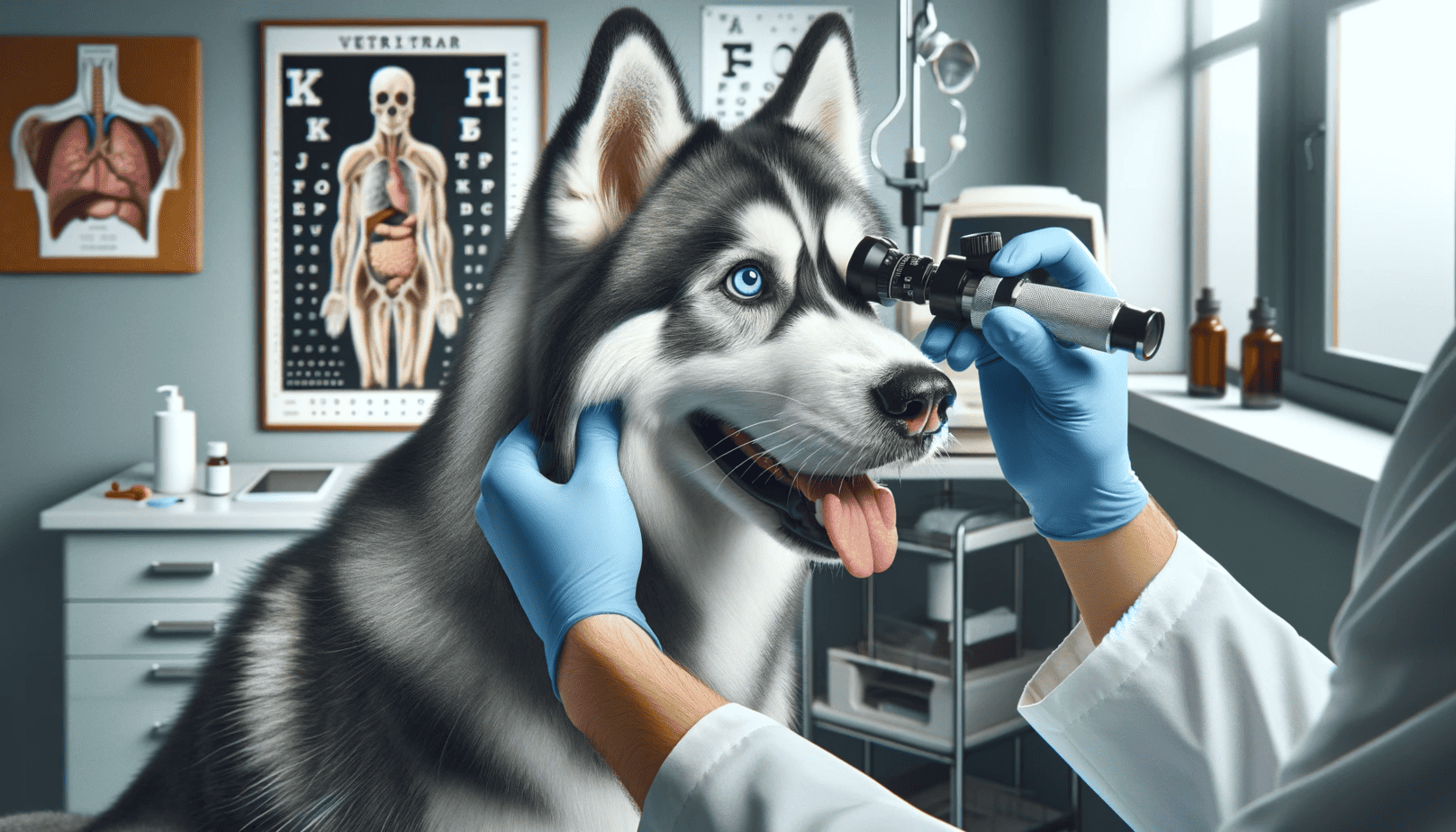
With their striking blue or multicolored eyes, Huskies are known for their unique eye characteristics. But, did you know that these beautiful eyes can be prone to specific health issues? From genetic conditions to environmental factors, there’s a lot to consider when it comes to Husky Eye Health.
But don’t worry! As a vet, I’m here to guide you through this. We’ll go over the common eye conditions in Huskies, vet recommended solutions, and how to prevent these problems in the first place. I’ll share some Husky eye care tips that I’ve learned over the years, including the role of diet, environmental hygiene, and routine eye care in maintaining your Husky’s eye health.
So, whether you’re a seasoned Husky owner or someone considering adopting this breed, this article will provide you with valuable insights into Husky Eye Health. Let’s dive in and learn how to keep those beautiful Husky eyes healthy and bright!
Understanding Husky Eye Structure
As a dog parent, understanding the unique structure of your Husky’s eyes is imperative in maintaining their overall eye health. Huskies, renowned for their striking eyes, possess a unique eye structure that necessitates specialized care. This section will guide you through the intricacies of your Husky’s eyes, arming you with the knowledge to provide optimal care for your furry friend.
Huskies typically have almond-shaped eyes that can be blue, brown, or a mixture of both. Their eyes are embedded deep into their skull, providing a broader field of vision. The positioning of their eyes, coupled with the epicanthic fold, a skin fold of the upper eyelid covering the inner corner of the eye, gives Huskies their distinctive wolf-like appearance.
The structure of a Husky’s eye also includes a third eyelid, known as the nictitating membrane. This translucent membrane serves as an additional protective layer, shielding the eyes from dust and debris while providing extra lubrication.
One unique feature that sets Huskies apart from other breeds is the tapetum lucidum, a layer of tissue in the eye that reflects visible light back through the retina, enhancing their night vision. This attribute is particularly beneficial for this breed, considering their historical background as sled dogs in regions with long, dark winters.
However, the unique eye structure of Huskies also predisposes them to certain eye health issues. Conditions such as progressive retinal atrophy, cataracts, and corneal dystrophy are more common in this breed and can lead to vision loss if not managed effectively.
Therefore, a thorough understanding of your Husky’s eye structure is the first step in recognizing any abnormalities early. Remember, early detection and treatment are crucial in managing eye health conditions. Armed with this knowledge, you are better equipped to ensure your Husky maintains optimal eye health.
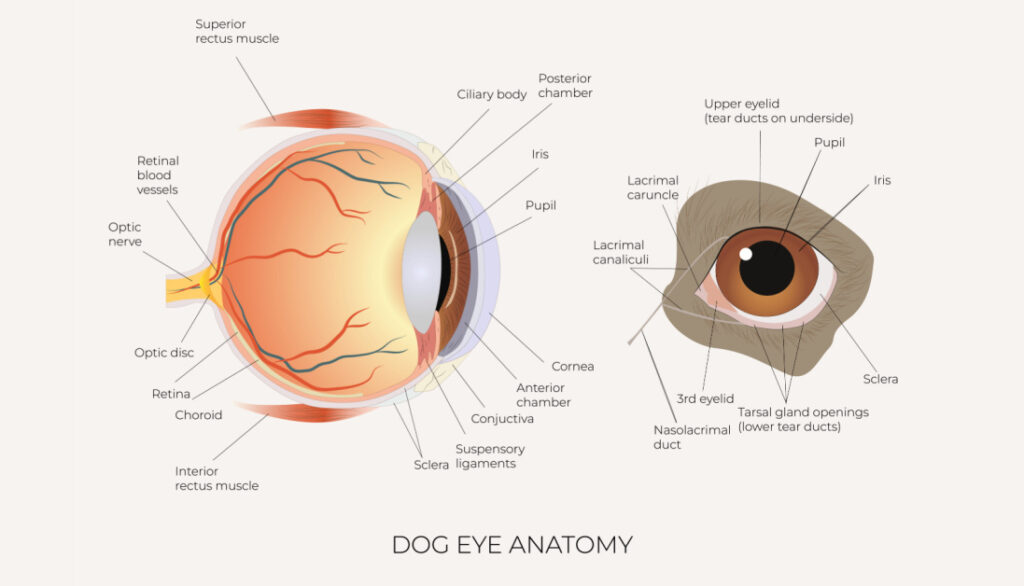
Common Eye Issues In Huskies
As a veterinarian, I’ve seen a variety of breeds, each with their own unique health challenges. One such breed is the Husky. Huskies, with their striking blue or multicolored eyes, are prone to a range of eye health issues. Understanding these conditions is crucial for early detection and treatment. Let’s delve into some common eye conditions in Huskies and the solutions we can provide.
Husky Eye Disease Treatment usually begins with identifying the problem. Here are a few conditions you should be aware of:
- Corneal Dystrophy: This is a hereditary condition that affects the cornea, causing cloudiness or a white, crystalline appearance. It’s generally painless and doesn’t affect vision in its early stages, but as it progresses, it can cause discomfort.
- Cataracts: Huskies are prone to hereditary cataracts, which can develop at a young age, leading to impaired vision or blindness if left untreated.
- Progressive Retinal Atrophy (PRA): This is a degenerative eye disorder leading to blindness. Unfortunately, there is no cure for PRA, but early detection can help manage the condition.
- Uveodermatologic Syndrome: Also known as VKH-like syndrome, this autoimmune condition causes inflammation of the uvea and can result in blindness. It can also cause depigmentation of the skin and hair.
As a vet, I recommend regular eye examinations for Huskies to detect these conditions early. Veterinary solutions for Husky eye health may include eye drops, surgery, or other treatments, depending on the specific condition.
Eye health in Huskies is a serious concern, but with the right care and attention, your Husky can lead a happy, healthy life. Remember, Husky Eye Health – Conditions & Solutions From Vet is a vital topic for Husky owners. It’s our responsibility to ensure these beautiful animals are given the best care possible.
Keep in mind, the earlier we can detect and address these issues, the better the outcome for your furry friend. So, regular vet visits and eye check-ups should be an essential part of your Husky’s healthcare routine.
Nourishing Your Dog’s Vision: Essential Nutrients for Eye Health
Ensuring your Husky gets the right nutrients for optimal eye health is essential for maintaining clear vision and preventing age-related issues. Natural, nutrient-rich foods and supplements can play a key role in supporting their eyesight. From vitamin A-packed freeze-dried liver treats to antioxidant-rich blueberries and targeted supplements like Eyeplex by Standard Process, there are several ways to nourish your dog’s eyes. In this section, we’ll explore how these powerful ingredients contribute to long-term vision health and overall well-being.
Eyeplex by Standard Process
Eyeplex by Standard Process is a specialized supplement designed to support your Husky’s eye health with a blend of essential nutrients. Formulated with key vitamins, minerals, and antioxidants, Eyeplex helps protect against oxidative stress, supports retinal function, and promotes overall vision health. Ingredients like vitamin A, vitamin C, and zinc contribute to maintaining strong eyesight, while whole food ingredients provide additional phytonutrients for cellular protection. Adding Eyeplex to your Husky’s diet can be especially beneficial for aging dogs or breeds prone to eye conditions, offering targeted nutritional support to keep their vision sharp and healthy for years to come.
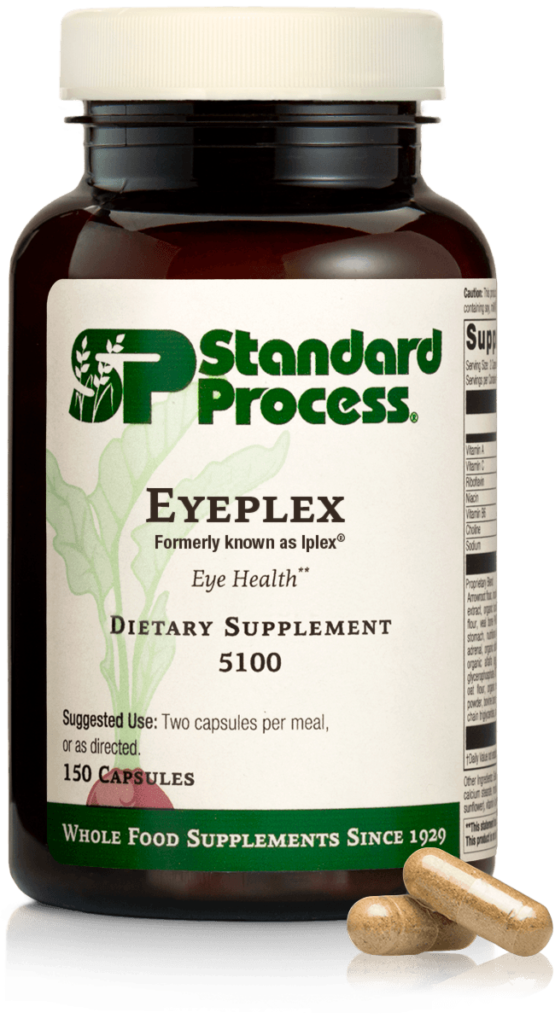
Freeze-Dried Blueberries
Freeze-dried blueberries are a powerhouse of antioxidants that can help protect your Husky’s eyes from oxidative stress and age-related damage. Rich in vitamins C and E, as well as anthocyanins, these tiny but mighty berries help combat free radicals that can contribute to eye diseases like cataracts and macular degeneration. Incorporating freeze-dried blueberries into your dog’s diet provides a natural and delicious way to support retinal health, reduce inflammation, and promote overall vision longevity. Plus, they’re a low-calorie, dog-friendly treat that makes a great addition to a balanced diet for long-term eye health.
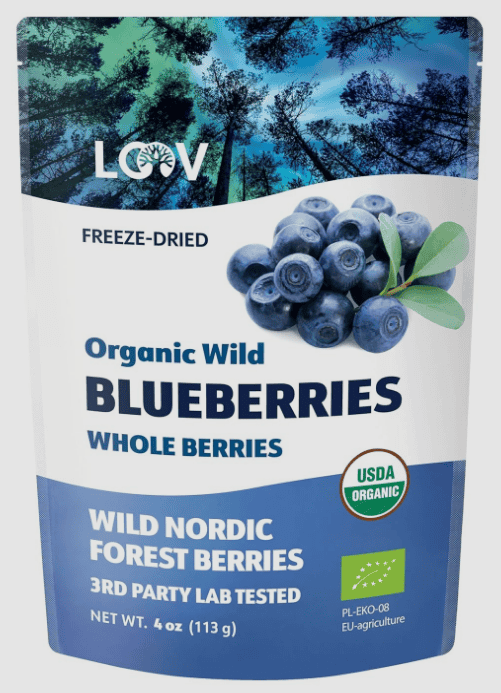
Freeze-Dried Liver
Freeze-dried liver treats are an excellent natural source of vitamin A, an essential nutrient for your Husky’s eye health. Vitamin A plays a crucial role in maintaining good vision, especially in low-light conditions, while also supporting overall immune function and skin health. Since liver is rich in bioavailable vitamin A, incorporating freeze-dried liver treats into your dog’s diet provides a convenient and nutritious way to promote optimal eye function. Just be sure to feed them in moderation, as excessive vitamin A can lead to toxicity. Adding these nutrient-packed treats to your pup’s routine is a simple, tasty way to support their long-term vision and well-being!
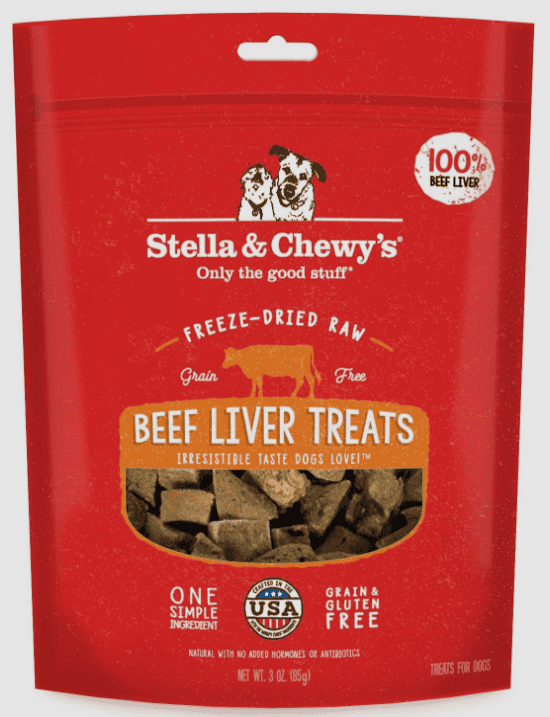
By prioritizing your Husky’s eye health through a balanced diet and nutritional supplements, you can help prevent many common eye issues. These simple steps can go a long way in ensuring your pup’s eyes stay healthy and clear for years to come.
Environmental Hygiene To Reduce Eye Problems
As a Husky parent, it’s crucial to understand that your pet’s environment plays a significant role in their overall health, especially their eye health. By maintaining a clean environment, you can help prevent many common eye issues that Huskies often face.
Indoor Air Quality
Firstly, let’s talk about indoor air quality. Poor air quality can lead to several eye problems in your Husky, such as dryness, irritation, and allergies. Therefore, it’s essential to ensure that your home has clean, fresh air circulating at all times.
- Consider using an air purifier to remove allergens and pollutants from the air. This can help reduce your Husky’s exposure to irritants that may cause eye problems.
- Regularly clean and dust your home to get rid of potential eye irritants like dust mites and pet dander.
- Ensure proper ventilation in your home. Open windows to let fresh air in and stale, polluted air out.
Sprays, Diffusers, Candles, Incense
Next, let’s discuss household products that could potentially harm your Husky’s eyes. Certain sprays, diffusers, candles, and incense can cause eye irritation in your Husky.
- Avoid using these products in the same room as your Husky. If you must use them, ensure your pet is in another room and that the room is well-ventilated.
- Choose pet-friendly products. Some brands offer pet-safe sprays, candles, and diffusers that are less likely to irritate your Husky’s eyes.
- Never spray any product directly towards your Husky’s face. This can cause immediate eye irritation and potential long-term damage.
Remember, your Husky’s health and well-being are your responsibility. By maintaining a clean, safe environment, you’re doing your part to ensure your Husky’s eyes stay healthy and clear. So, keep these tips in mind and make the necessary changes in your home environment to protect your Husky’s eye health.
Always consult with a vet for professional advice on Husky Eye Health – Conditions & Solutions From Vet.
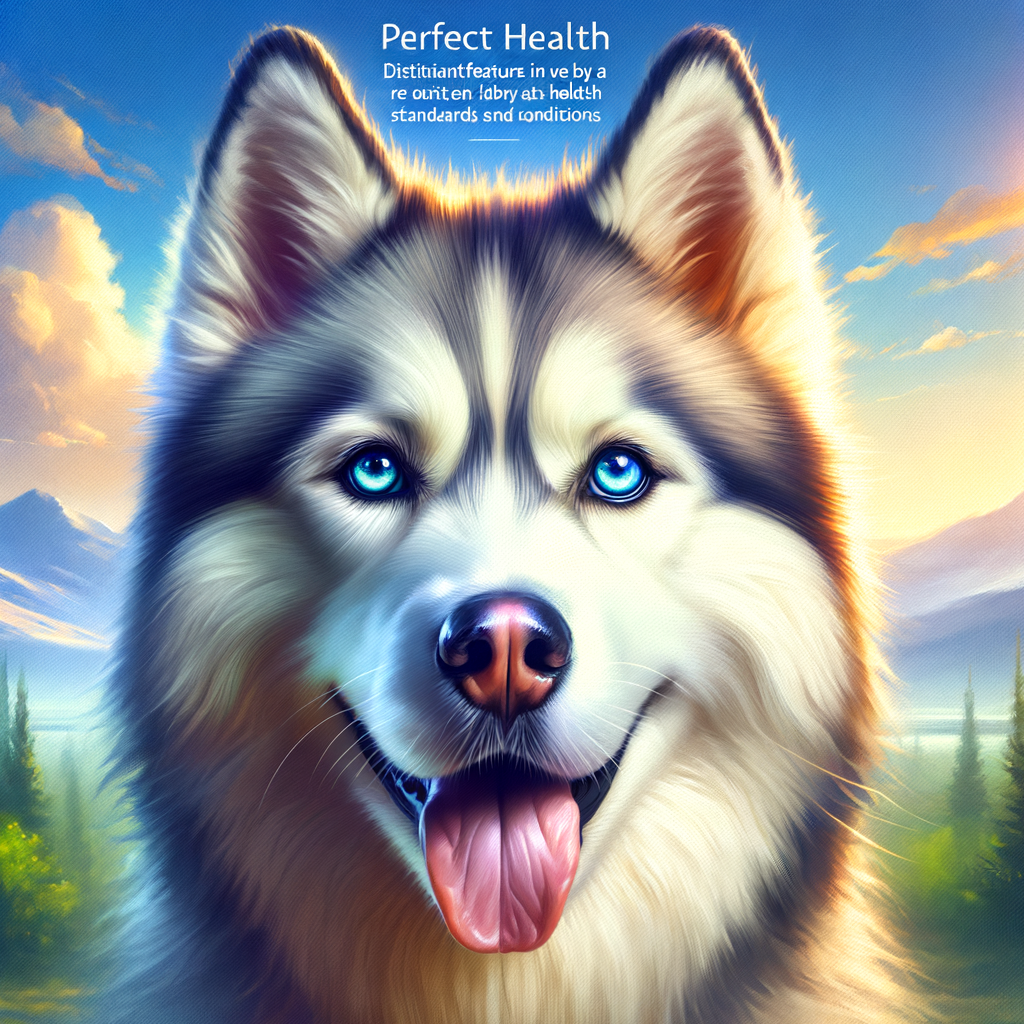
Routine Husky Eye Care & Maintenance
As a concerned Husky parent, it is vital that you know the ins and outs of routine Husky eye care and maintenance. Husky eye health is a crucial aspect of your dog’s overall well-being and neglecting it can lead to serious problems. But with consistent care and monitoring, your Husky can enjoy a lifetime of good eye health.
Daily & Weekly Care & Maintenance
Just like humans, dogs need daily and weekly care for their eyes. Start by checking your Husky’s eyes daily for any signs of redness, cloudiness, or excessive tearing. If you notice anything unusual, it’s best to consult your vet immediately.
Next, make it a habit to clean your Husky’s eyes at least once a week. You can do this using a soft, damp cloth or a canine eye wipe. Gently wipe around the eyes to remove any discharge or dirt. Remember to use a new cloth or wipe for each eye to avoid spreading any potential infection.
Also, it is important to keep an eye out for any changes in your Husky’s vision. If your Husky seems to be bumping into things or having trouble seeing, it could be a sign of an eye condition.
Monitor Hair Length, Nail Length, Bath Frequency
Surprisingly, other aspects of your Husky’s grooming routine can also impact their eye health. For instance, long hair around the eyes can irritate them and lead to infections. Therefore, it’s important to keep your Husky’s hair trimmed and away from their eyes. You can do this yourself or take your Husky to a professional groomer.
Nail length is another factor to consider. Long nails can scratch your Husky’s eyes, causing injury or infection. Regular nail trims can prevent this problem.
Finally, consider your Husky’s bath frequency. While it’s important to keep your Husky clean, excessive bathing can dry out their skin and eyes. Aim for a balanced routine that keeps your Husky clean without causing dryness or irritation.
As a Husky parent, your dog’s health is your top priority. By following these routine care and maintenance tips, you can help ensure your Husky’s eyes stay healthy for years to come. And remember, if you ever have any concerns about your Husky’s eye health, don’t hesitate to consult with a vet for professional advice and solutions.
Frequently Asked Questions
- What are common eye conditions in Huskies?
Common eye conditions in Huskies include cataracts, corneal dystrophy, progressive retinal atrophy, and glaucoma.
- How can I prevent eye problems in my Husky?
To prevent eye problems in your Husky, make sure to keep their eyes clean and free from debris, avoid exposing them to irritants or chemicals, and provide a balanced diet with essential nutrients.
- What are the signs of an eye infection in Huskies?
Signs of an eye infection in Huskies may include redness, swelling, discharge, excessive tearing, squinting, and frequent blinking.
- Can Huskies develop hereditary eye diseases?
Yes, Huskies can develop hereditary eye diseases such as juvenile cataracts, corneal dystrophy, and progressive retinal atrophy. Regular eye examinations by a veterinarian are crucial to detect and manage these conditions.
- What should I do if I notice any abnormalities in my Husky’s eyes?
If you notice any abnormalities in your Husky’s eyes, it is recommended to consult a veterinarian as soon as possible. They can properly diagnose the issue and provide appropriate treatment or management options.
